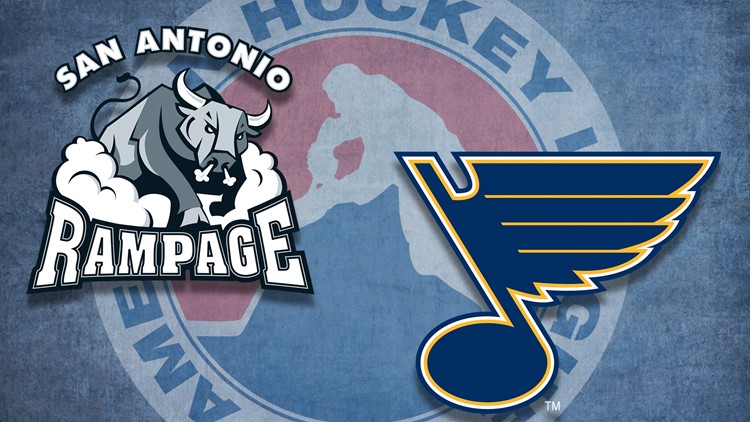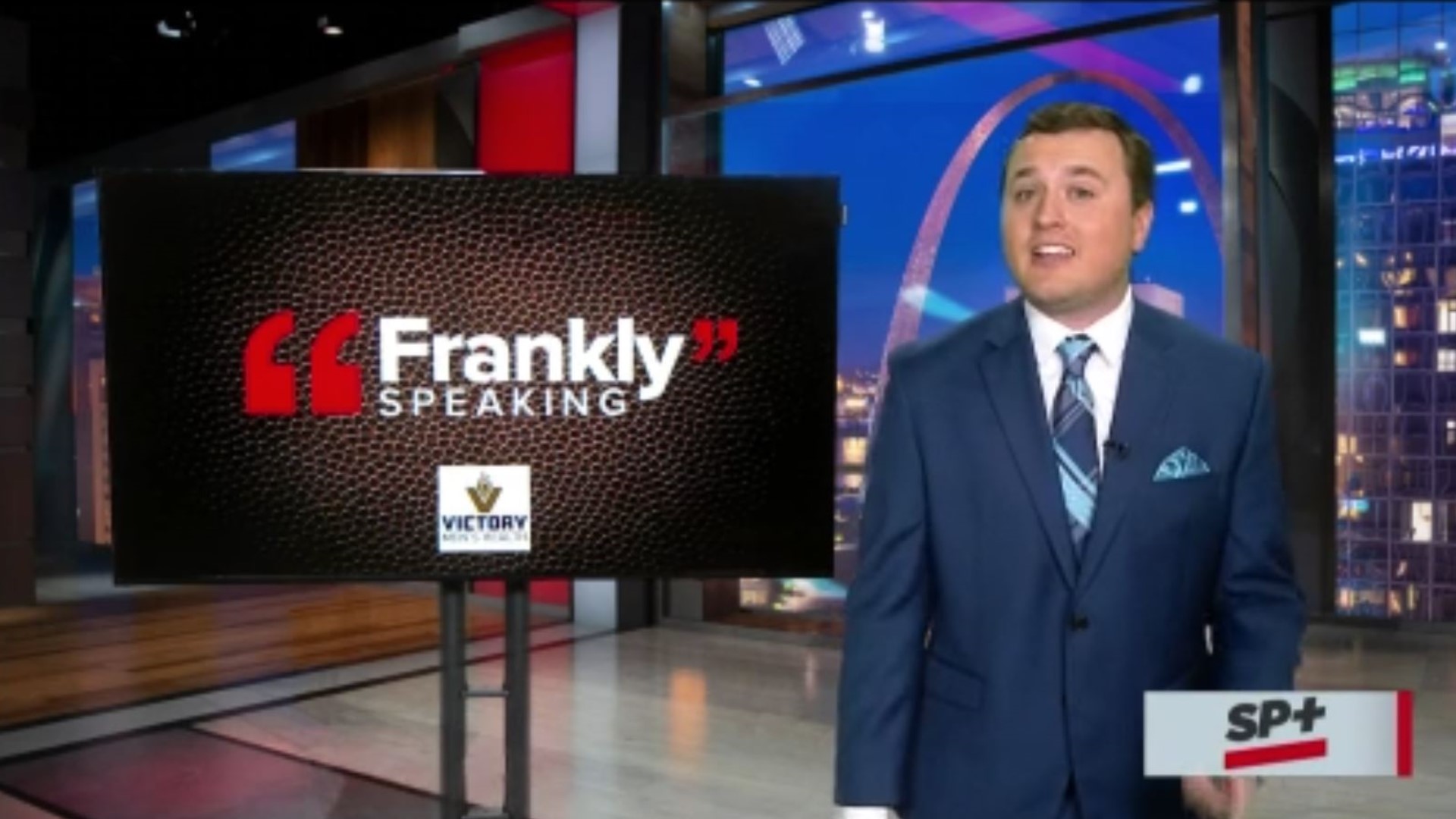ST. LOUIS — Just two years after the Blues lost their AHL affiliate, the Chicago Wolves, to the newest NHL expansion team, the Blues again find themselves heading into a season without an affiliated team.
On Thursday, Spurs Sports & Entertainment announced they sold the San Antonio Rampage, the Blues' current AHL affiliate, to another NHL team. The Rampage will relocate and will no longer serve as the Blues' partner.
The Vegas Golden Knights were the culprit for the Blues' AHL struggles in both cases. The last time, Vegas' entrance into the NHL saw them reach a deal with the Wolves for the following season as the Blues' contract with the Chicago team had ended with the 2016-17 season. This time, Vegas has outright purchased the AHL franchise, despite the contract between the Rampage and Blues initially signed through the 2022-23 season.
"The Blues will finish the remainder of the 2019-20 season with San Antonio as our AHL affiliate," Blues general manager Doug Armstrong said in an official statement. "In the meantime, our pursuit of a new minor league affiliate will begin immediately. We will have no further comment on this topic at this time."
When the Golden Knights signed a deal with the Wolves, it caused a numerical indifference between the NHL and AHL. The NHL expanded to 31 teams, while the AHL stood pat with 30 teams until 2018-19, when the Colorado Eagles joined the league. The one season with the differing number of teams meant that one NHL franchise would be on the outside of the AHL looking in. This caused the Blues to loan players throughout the AHL, meaning Blues prospects were split across the league.
One notable instance came with current Blues starting goalie and Stanley Cup champion Jordan Binnington, who was loaned to the Providence Bruins, the affiliate of the NHL's Boston Bruins.
With the AHL likely remaining at 31 teams, this unique situation will likely not occur this time around, but a problem still presents itself for the Blues.
The easiest and most likely solution is that the Blues will return to the Wolves, who currently do not have an NHL team heading into the 2020-21 season.
Note the difference between owning an AHL franchise and partnering with an AHL franchise. When the Blues owned the Peoria Rivermen, they controlled every aspect of the organization. From the head coach to the starting goalie for the night, everything ran through the Blues' organization. Since then, though, the Blues' affiliation with AHL Chicago and San Antonio has seen the AHL franchise make those decisions, based on what was best for said team.
For example, during the 2014-15 season, the Blues' second season affiliated with the Wolves, Binnington was mostly considered a split starter, receiving just 45 starts. Matt Climie, who was under contract with the Wolves and not the Blues, received 37 starts. If the Blues had their way, Binnington likely would have been the full-fledged starter, even if he struggled, because he was property of the Blues and considered an NHL prospect. Climie, then a 32-year-old journeyman, would have simply been the calming presence across the ice in practice.
To rent or to own?
This issue leads to the ultimate question: would the franchise rather spend a lot more money but control the fate of their prospects or save some cash but not have as much control?
If Option B is the answer, the Blues will likely return to Chicago for its affiliation. However, what if Option A was viable?
When Blues owner Tom Stillman took majority control of the organization, he took his stakes out of the AHL's Peoria Rivermen franchise and moved his prospects north to Chicago. This was an exponential cost-cutting measure due to the Blues serving as a mid-level profit team, comparably speaking to the rest of the NHL. However, with the recent success of the organization and the hockey boom currently transpiring in St. Louis, profits are likely at an all-time high, at least during Stillman's regime. If there was ever a time to strike and flat-out buy an AHL franchise, the iron will never be hotter.
According to Statista, a business-data platform that tracks financial insights across the globe, the Blues have seen a 42.7% growth in revenue since 2007-08, when Stillman came aboard as a minority owner. And just since 2012-13, when Stillman took over majority control of the franchise, the Blues have seen a 42.1% jump in profits.
This doesn't mean much, though. If Stillman and Co. are happy with their affiliation agreements of the recent past, they would be apprehensive to buy up another franchise. Let's not forget that this is a business and the people up top need to think in much different terms than hockey fans do. The goal is to keep those profits rising year after year, not to start taking on money hemorrhages.
If they did decide to expand their operation, though, there's a spot 300 miles west of St. Louis that would serve as an excellent target for a team.
The Fountain City
Despite sitting across the state from St. Louis, Kansas City, arguably, has also benefited from St. Louis' hockey boom. In fact, the Kansas City Mavericks, an ECHL club, which is one step below the AHL, recently hosted a crowd of 5,858, which was max capacity at the Silverstein Eye Centers Arena, on New Year's Eve. This was their largest crowd on record. Although their average attendance is a tick below this number, an average that sits around their sellout number would place them 13th in the AHL this season, according to hockeydb.com.
The Mavericks changed its name from the Missouri Mavericks following the 2016-17 season, in a move that GM Brent Thiessen said would "unify the entire city." He stated that the Mavericks received tremendous support from its partners in the state of Kansas, so it was not "just a Missouri product." He also added that the Mavericks are committed to the ECHL and had no plans to move to the much larger Sprint Center in downtown Kansas City.
However, at the time of the name change, only two AHL teams were named after a state. A move to the next hockey level would seemingly be a smooth transition in those terms.
That may be making a mountain out of a molehill, but also consider growth of playing the sport in the area. According to the Kansas City Youth Hockey Association, youth hockey has grown 25% in recent years with more than 1,000 players in the area fully committed to the sport.
Also, Kansas City, which has hosted numerous preseason NHL games, always finds itself in the mix for NHL expansion or team relocation.
"Kansas City has never been entirely off our radar screen," said Bill Daly, the NHL's deputy commissioner. "We have talked to potentially interested stakeholders in the past, and it's certainly a market that, in the right circumstances, our league would fairly evaluate and consider."
There's no better way for the NHL to test the waters than give it the second-best hockey league in the world.
Outright purchasing the franchise sounds like a quick and simple move, but it would likely take some convincing of current owner Lamar Hunt Jr. Also, the ECHL would likely want to block the switch to the AHL, as well, as the Mavericks currently average the 10th best attendance figures in the league. The AHL would likely have to relocate a team, as well, which would be a fight in itself.
There are definite barriers for this move to take place, but with the Blues likely weighing options, Kansas City must be getting a solid look. The advantages of having call-ups coming from a three-hour drive (or 45-minute flight), are endless. A last-minute injury or illness on the NHL roster could still see someone make the trip from the AHL, even if taken place hours before puck drop. Scouting the team's prospects is a short trip for Blues management, while watch parties or events for the NHL club across the state would likely drum up more interest in all of Missouri.
Most importantly, the Blues would have a staple within the AHL. Outside of the Blues, the closest NHL club to Kansas City is Dallas (508 miles). However, the Stars' current AHL affiliate is located in Cedar Park, which is near Austin, or 195 miles from downtown Dallas. Also, the Stars currently own their AHL team.
It's unlikely another NHL team would attempt to poach Kansas City from the Blues if it was just an affiliation situation, due mainly to distance. NHL clubs prefer their affiliates housed nearby, so the Blues could feel comfortable signing a multi-year deal.
Vegas would have to go above and beyond to steal another AHL affiliate from under the Blues' nose if Kansas City is in the mix.



